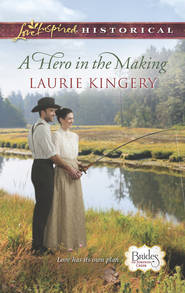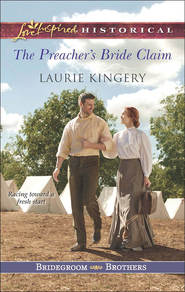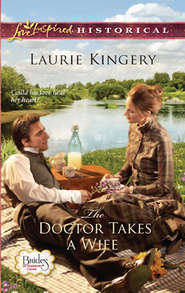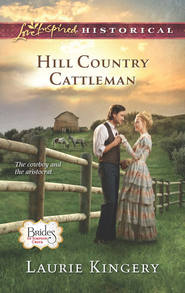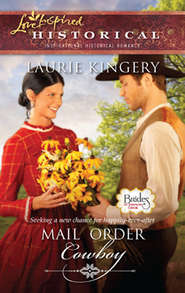По всем вопросам обращайтесь на: info@litportal.ru
(©) 2003-2025.
✖
The Rancher's Courtship
Настройки чтения
Размер шрифта
Высота строк
Поля
Questions for Discussion (#litres_trial_promo)
Chapter One
Simpson Creek, Texas
October 1868
Jack Collier looked up and down the main street of the little town of Simpson Creek, but try as he might, he didn’t see a druggist’s store. A hotel, a mercantile, a post office, a combined barbershop-bathhouse, a jail, a bank, a doctor’s office and a church, yes, but no druggist’s shop. A search of the side streets and Travis Street, which ran parallel to Main Street, netted the same lack of results.
He’d been the recipient of several second looks by the townspeople, as he rode down the streets, his own horse flanked by the dependable old cow pony that didn’t mind his twin daughters riding double on it. People tended to stare at twins, and yet it seemed to be his own face they focused on, not Abigail’s and Amelia’s.
Well, he’d always been told he looked a lot like Pete, so that must be the reason for the stares. He started to ask one or two of them if they knew where to find his brother, but he had wanted his arrival to be a surprise for Pete. He didn’t want anyone running ahead of him with the news.
But where was Pete? Had he gone into some other line of work since he’d last written Jack? It was possible, Jack supposed, but it wasn’t like Pete to change his mind on such a matter. Pete had always set a course, then held to it. He’d traveled up to the Hill Country town in San Saba County last year with the announced goals of meeting the lady he’d been corresponding with and opening up his own druggist’s shop. Around Christmas, Pete had written that he and Miss Caroline Wallace were in love and would be married in early spring. He wanted Jack to be there.
That was the last time he’d heard from Pete—no letter, no wedding invite had followed.
Mail went astray all the time, though. He and his daughters had probably missed the wedding, but Jack had assumed he’d find Collier’s Drugs and Patent Medicines prospering, with his happily married brother as the proprietor. Pete and his bride would have a little house on one of these side streets, no doubt with a picket fence around it and the smell of freshly baked bread wafting from the kitchen.
“When are we gonna find Uncle Pete, Papa?” queried his daughter Amelia, clutching a china-headed doll to her chest.
“Yeah, and Aunt Caroline?” her twin sister, Abigail, piped up from behind her. “Did they go someplace else?”
Jack rubbed his chin and considered the matter. “I don’t know, girls, but I’m sure enough going to find out.”
After riding up Travis Street, they’d passed the churchyard and headed back onto Main Street, but now he paused by the jail to look around him, wondering where the best place to make inquiries would be.
“Can I help you, mister?”
Jack looked down to see a lanky Mexican youth with black hair and dark eyes looking up at him from beside the open door of the jail. He wore a five-pointed star that had “Deputy” inscribed across its middle.
The sheriff ought to know where to find any of the small town’s inhabitants, Jack reckoned. “Is the sheriff in, Deputy?”
“Sheriff Bishop is away for a few days, sir. I’m Deputy Luis Menendez—perhaps I may help you?” The last part was said with courteous pride.
“I hope so. We’re looking for Peter Collier and his wife, Caroline. He’s my brother. He was supposed to have started a druggist’s shop here in Simpson Creek, but I don’t see one, so maybe his plans changed. Would you know where they live?”
The young man’s brow furrowed, and something troubled shone in the obsidian depths of his eyes. “Miss Caroline is the schoolteacher. Perhaps it is best you speak to her.”
“Miss Caroline?” What in thunder? Had Caroline and Pete had a falling-out and never married? Had Pete left Simpson Creek? Why hadn’t he written Jack about it? Jack had made plans based on what Pete had told him, and if the marriage was off and Pete had gone elsewhere, Jack was going to find himself in a right pickle.
He was conscious of the youth still studying him, a hand shading his eyes from the bright sun. “May I direct you to the schoolhouse, Mr. Collier?”
Jack shook his head, “No, we passed it a while back, while we were looking for his shop, so I know where it is. Thanks.”
The rapping at the door startled Caroline. Who could it be? Her pupils were all present and accounted for—two dozen in number and ranging from first to sixth-graders. Now they all raised their heads from the slates on which they were working sums and looked behind them. No one in Simpson Creek would think of knocking on the door of the one-room schoolhouse. If they had to interrupt the schoolmarm during class, they’d likely just barge right in and explain their business.
When the knock quickly sounded again, as if whoever stood outside had grown impatient, Lizzie raised her hand. “Miss Wallace, do you want me to see who’s there?”
“No, thank you, Lizzie. I’ll do it. Please continue your work.” Rising, Caroline left her desk, walked down the aisle that separated the girls from the boys and went to the door. She hoped whoever it was wouldn’t stay long. It was hard enough to keep her students working on arithmetic in the last hour of the school day, even without interruptions. Most of them were fidgeting, staring longingly out the one-room schoolhouse’s open window to where fall sunshine beckoned. When would she learn to drill them in mathematics in the morning, when they were still fresh? But she’d only been the schoolteacher for a month, having taken on the job when Miss Phelps left.
She opened the door to see two little girls standing on the uppermost step. They were as alike as two peas in a pod, both dark-haired and blue-eyed, each one’s hair done in two thick braids with red bows at the end, their dresses blue gingham with white pinafores. Each clutched a doll with a dress that matched what its owner wore.
Beyond them she could see a man with his back to her, securing the second of two horses to the hitching rail next to the mule a pair of her students rode to school.
“Them girls is exactly the same,” breathed Lizzie, peeking around her teacher from behind.
“Those girls are exactly the same,” Caroline corrected automatically. “Please go back to your seat, Lizzie.”
“Ain’t you ever seen twins before, Lizzie Halliday?” one of the boys hooted scornfully.
“Haven’t you,” Caroline corrected again. “Class, be quiet while I speak to their father.” She could only guess the man was here to register his daughters, though why he’d come in the afternoon, rather than first thing in the morning, she couldn’t imagine—nor why a father would be bringing the children, rather than their mother. A closer look at the girls’ dresses revealed a smudge on the hem of one, a rip in the sleeve of the other. Maybe their mother was ill? Or…well. Perhaps there was no mother anymore.
The two girls smiled in unison at her, and Caroline felt an instant liking for them. Already mentally rearranging the seating chart to accommodate two more students while the man was turning from the hitching rail, she now focused on his face.
And blinked. And stared, as he climbed the steps and came closer.
Like his daughters, the man had blue eyes and black hair, but the eyes that studied her were so like Pete’s eyes—Peter Collier, her fiancé, who had died in the influenza epidemic last winter, and for whom she still wore mourning black. The mouth that now narrowed reminded her of Pete’s mouth, a mouth that had kissed her many times, and would never do so again.
Oh, no, she was doing it again. Right after Pete had died, she had frequently seen his face in that of strangers passing through town, and her heart would give a little happy leap before her brain realized it was not Pete. Yes, that must be the case. I only think the man looks like Pete. The resemblance will fade in a moment, as it always has before. It isn’t real. Pete’s brother would have come long ago, if he was going to.
“You’re Miss Caroline Wallace? I was told I would find her here,” the man said. Absently she noted that while his voice was similar, it didn’t have Pete’s exact cadence. Pete always said what he meant right out. This man’s voice was deeper and had more of a considering drawl to it.
He continued to study her as if he found her black dress mystifying—had he never seen mourning clothes before?
“Please, come in,” she said, gesturing. “You have children to enroll, sir?” she asked, with a meaningful look at them.
They did as she had bidden, stepping into the back of the classroom. The man opened his mouth to say something, but before he could reply to her question, one of his twins asked, “Are you our Aunt Caroline? And where’s Uncle Pete?”
Caroline felt her jaw drop and her heart begin to pound as she raised her gaze from the little girl to her father.
“I’m Caroline Wallace,” she said slowly, realizing that she had guessed correctly to begin with. “And you are—?”
The man’s gaze narrowed. “Jack Collier, Pete’s brother. These are my daughters, Amelia and Abigail. Aren’t you supposed to be ‘Mrs. Collier’ by now? Where’s Pete?”
She felt the color drain from her face and leave a coating of ice behind. It couldn’t really be happening. Pete’s brother couldn’t have shown up now, unaware his brother was dead, some seven months after Pete’s funeral.
But thinking it could not be so didn’t make it any the less true, and she realized with panic she would have to be the one to break the news to him. She wondered who had told him how to find her, yet had not mentioned his brother was dead.
Determined not to tell him about Pete in front of the two bright-eyed children staring curiously at her—not to mention all the other children eyeing them with avid interest—she forced herself to speak normally.
“Why don’t we let your daughters play outside with the other children for a few minutes?” she suggested.
He gave a curt nod by way of permission, his eyes still narrowed, and she bent to speak to Lizzie, whose desk was nearby. “Lizzie, will you take Amelia and Abigail with you and introduce them to the other girls? Let them play with you?”
“Yes, Miss Wallace. Are they gonna come t’ school with us?”
“We’ll see.” In a louder voice she said, “Class, we’ll take a fifteen-minute recess.” The boys didn’t hesitate, scrambling out of their seats and out the door almost before she finished speaking, as if fearing their new schoolmarm would change her mind. The girls were a bit slower but, clustering around the twins, made their way out the door just as happily.






